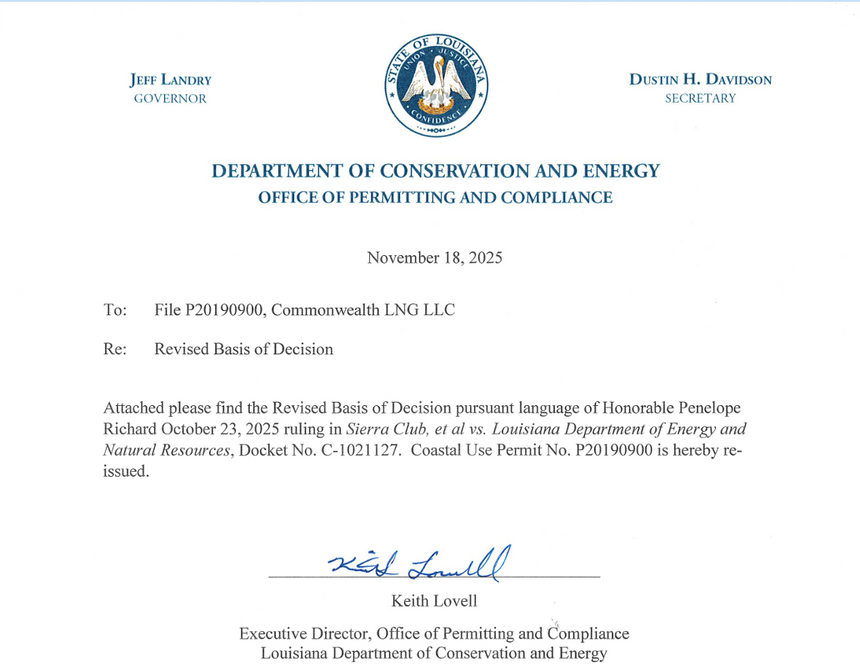On November 18, 2025, the Louisiana Department of Conservation and Energy (LDCE) re-issued a Coastal Use Permit (CUP) with a revised Basis of Decision that incorporates environmental justice (EJ) and climate change assessments related to Commonwealth's proposed LNG facility. LDCE is re-issuing the CUP following a Louisiana district court's vacatur of the prior CUP for the Commonwealth LNG facility based on the court’s finding that LDCE failed to analyze EJ or climate change impacts.
LDCE stated in the revised Basis of Decision that it is not conceding the correctness of the district court judgment or forgoing the right to challenge the judgment. Rather, LDCE determined that it is in the best interest of the State to not delay the matter further and is thus addressing the issues raised by the district court, namely the “facility’s impact on climate-related change in the coastal zone, if any, in conjunction with the other LNG facilities in the area, as well as [EJ] issues.”
At the outset of its own analysis, LDCE noted that the administrative record for the matter already contains a discussion on EJ and climate change impacts, specifically referencing the Federal Energy Regulatory Commission's (FERC) Final Environmental Impact Statement (FEIS) and the Louisiana Department of Environmental Quality's (LDEQ) air permitting basis for decision.
Environmental Justice
LDCE initially provided that “re-creation of the EJ analysis undertaken by both the FERC and LDEQ is no longer possible as the [EJ] tools they utilized, such as EPA’s EJ Screen, are no longer available" following the issuance of a President Trump Executive Order.
Nonetheless, LDCE extensively quoted from the FERC FEIS that outlined potential adverse environmental impacts on EJ communities, including impacts on wetlands, social patterns, commercial and recreational fishing, and the cumulative impacts related to each. LDCE stated that it independently reviewed the EJ analysis and agrees with the FEIS’s determinations, concluding that the project’s environmental impacts on EJ communities will be less than significant and will not impose disproportionate adverse effects based on race, color, national origin, or income.
Climate Change
LDCE also quoted from the FERC FEIS and LDEQ basis for decision's discussion on the potential climate change-related impacts, including flooding and storm impacts, associated with the proposed project. LDCE again indicated that it independently reviewed climate change impacts and agrees with both agencies' analyses. After this analysis, LDCE stated that "the benefits of this project outweigh the costs to the community” after considering the facility’s potential impact on climate-related change in the coastal zone, in conjunction with that of the other LNG facilities in the area.
For more information, please contact Liskow attorneys Greg Johnson, Clare Bienvenu, Emily von Qualen, and Colin North, and visit Liskow's The Louisiana Industrial Insights Hub to follow along to stay up-to-date on Public Trust Duty developments.


/Passle/6862a7c82f493872278415a8/SearchServiceImages/2025-11-25-16-35-38-563-6925dada600f673af5ec6550.jpg)
/Passle/6862a7c82f493872278415a8/SearchServiceImages/2026-01-12-21-54-20-866-69656d8cab784af100f487de.jpg)
/Passle/6862a7c82f493872278415a8/SearchServiceImages/2026-01-09-16-29-04-197-69612cd0d42b6e4a5840eeba.jpg)
/Passle/6862a7c82f493872278415a8/SearchServiceImages/2026-01-05-17-15-19-521-695bf1a7f06df27e3856bce6.jpg)